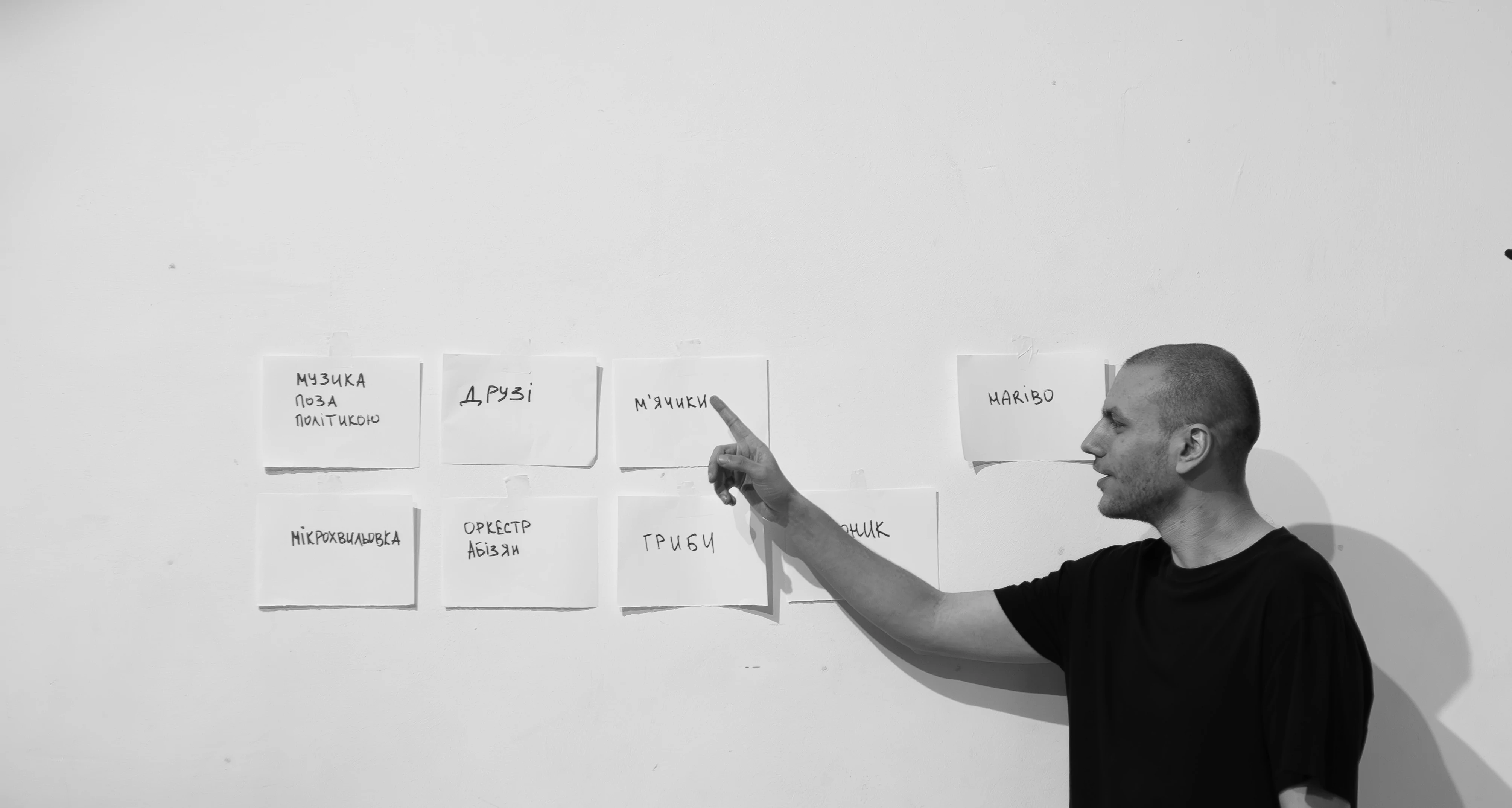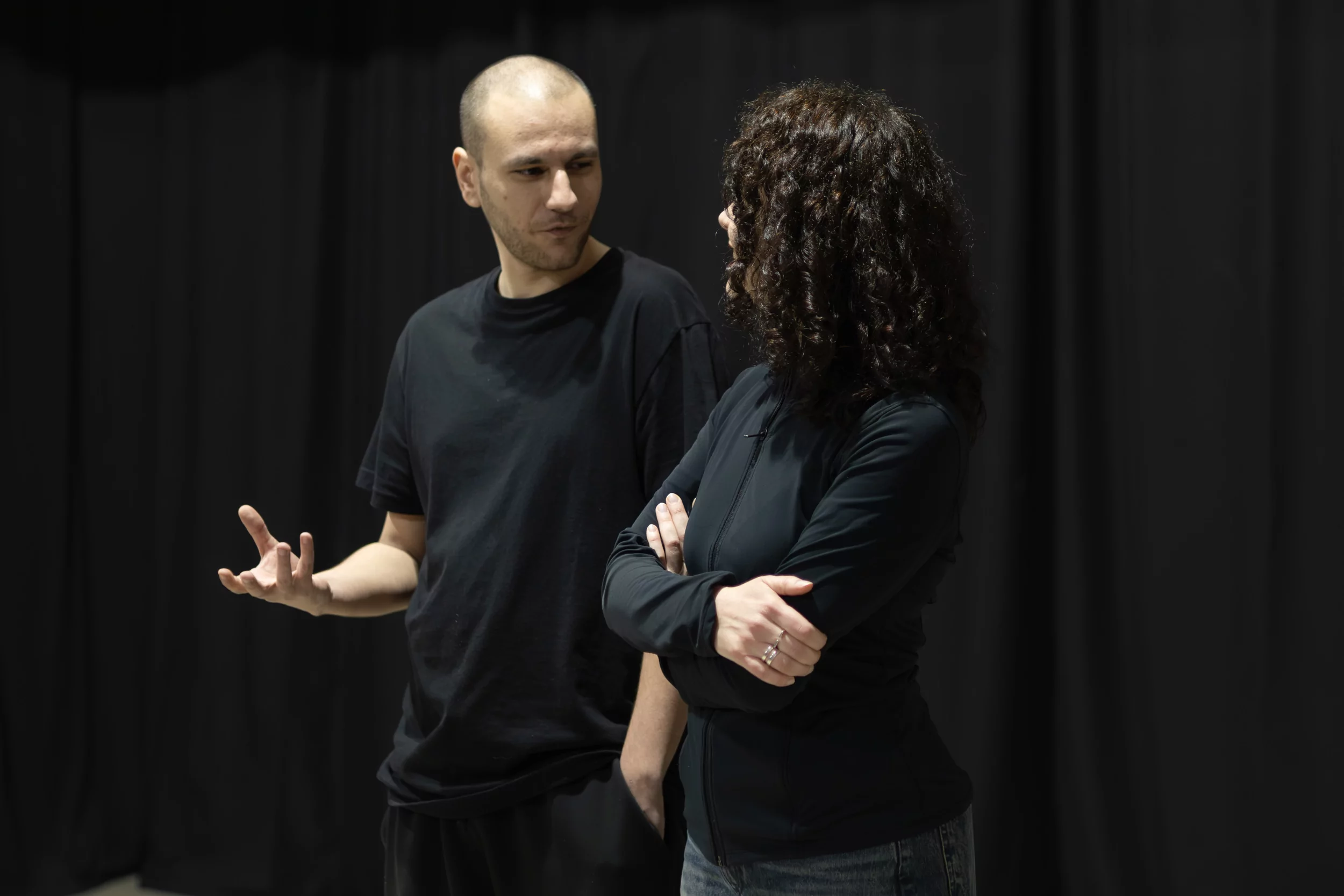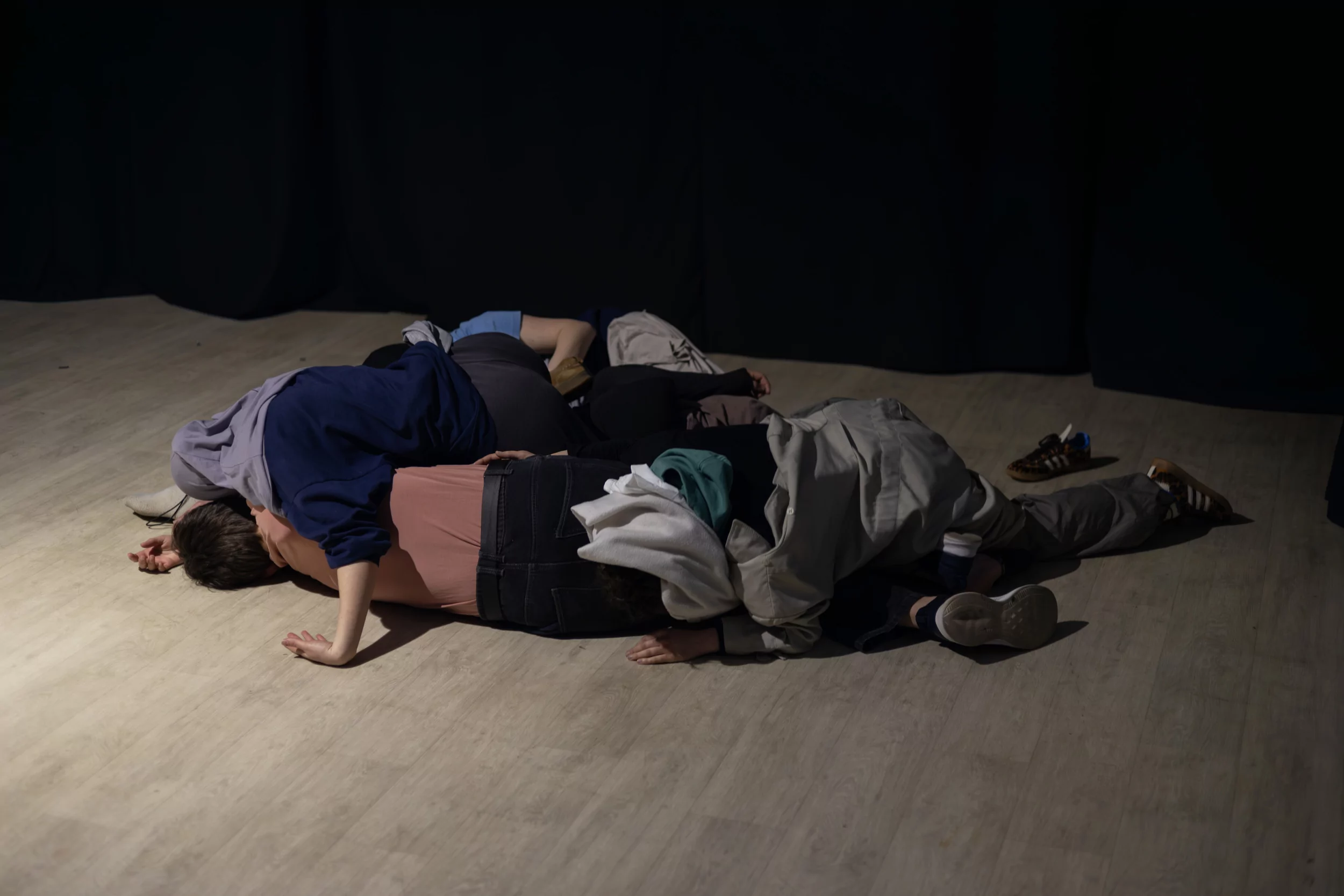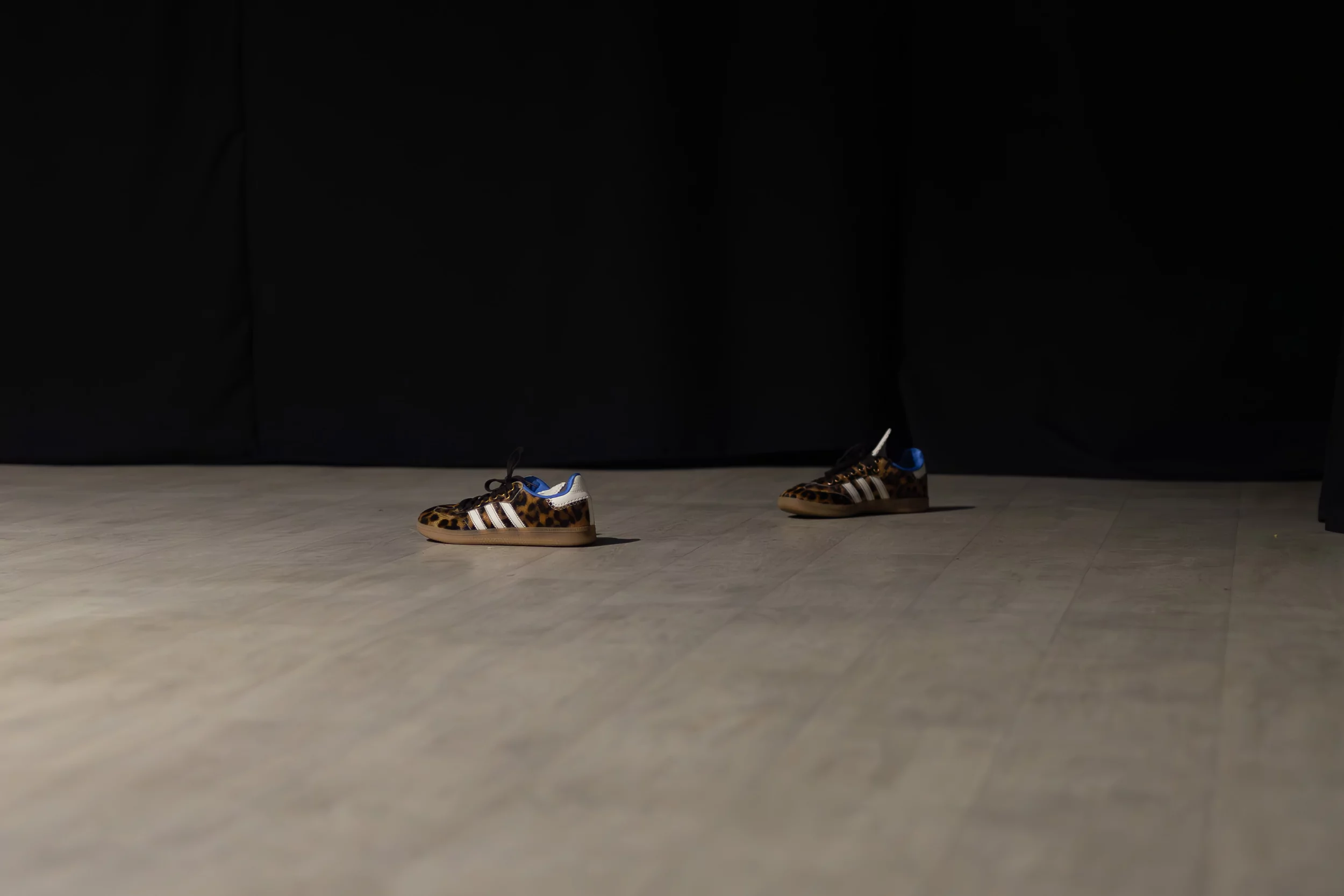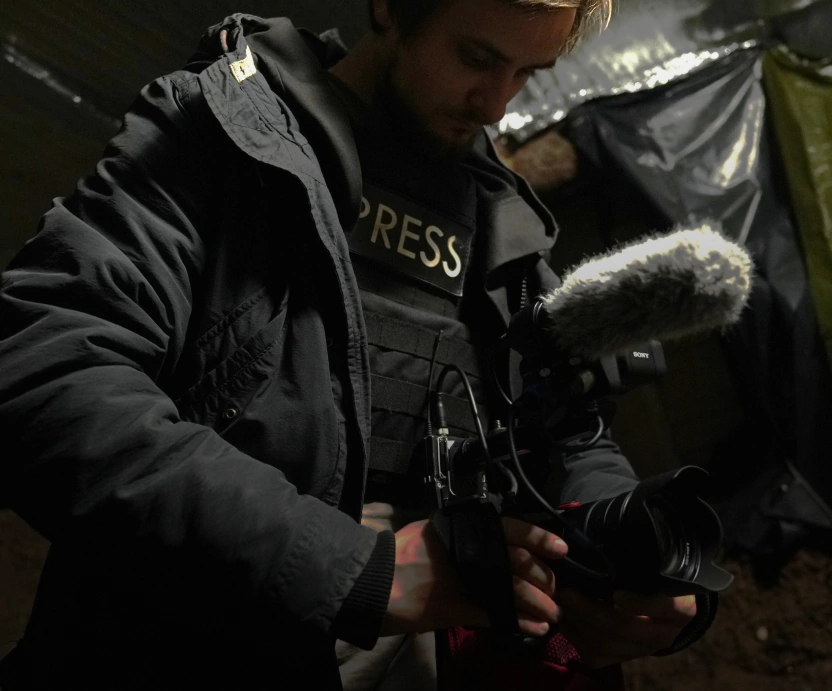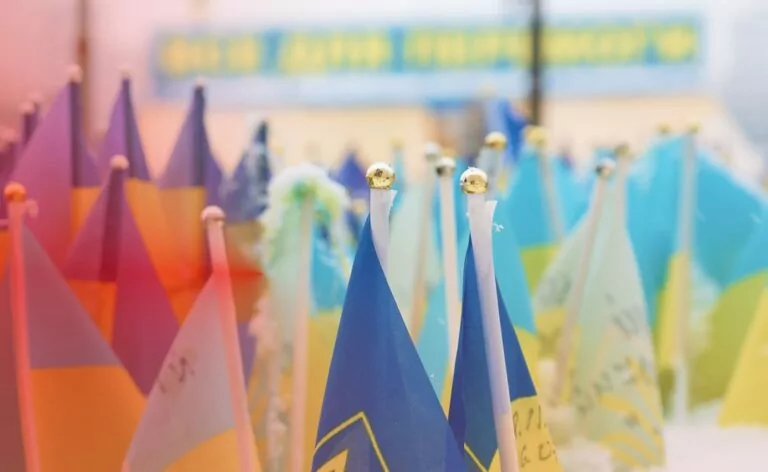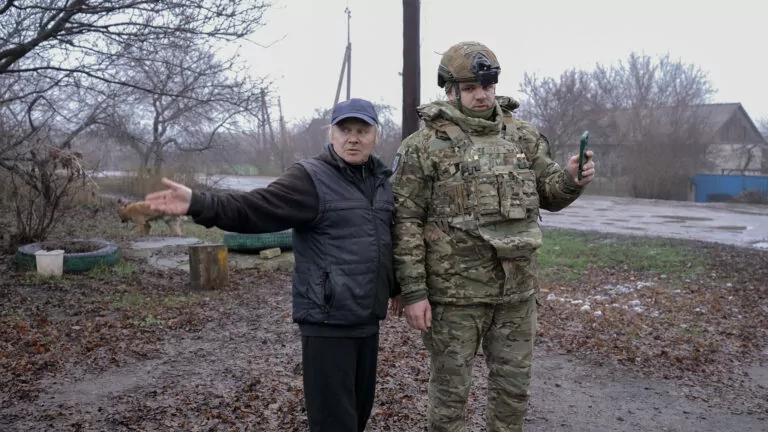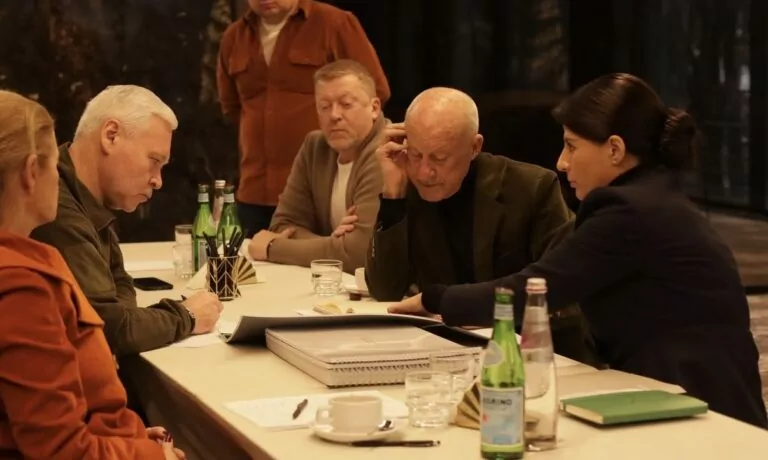Alin Uberti is a Romanian theater director who spent a month between February and March in Kharkiv. In collaboration with Ukrainian playwright Liuba Ilnytska and Nafta theater, he organized a performance lab in the city. Within SONLAB, young practitioners studied contemporary theater instruments — and tried themselves in different roles.
Gwara talked to Uberti back in April — when he’s already returned to Bucharest — about ways theaters work, theaters’ audiences in Romania and Ukraine, influences of the Soviet occupation on dramaturgy in both countries, and art’s connection to politics (among other things).
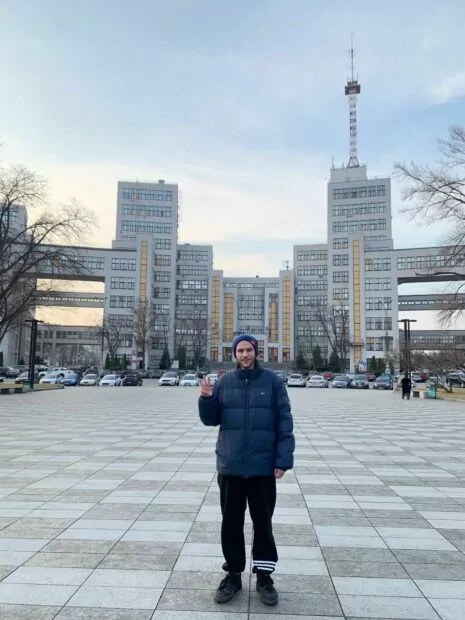
Director as a god vs. community-based effort
What made you decide to go to Kharkiv?
I have previous experience in Ukraine, I worked in Lviv before. I did a performance in Jam Art Center, and had a lecture and a theater workshop there. I liked that experience very much, liked meeting young theater practitioners. Liuba Ilnytska has been telling me about Kharkiv — she loves the city — so I contacted Nafta and offered to run a laboratory with Liuba. They were happy about it and accepted, so this is how I ended up in the city.
Contemporary theater instruments you’re teaching — what kind of instruments are those?
I think Romania and Ukraine have a mutual problem, at least from what I hear. It’s a traditional orientation of classes for theater and theater practice. We’re always talking about starting work from text, text-based performances. Institutions focus on one specialization. You graduate — and you can only act or only direct. From what I see in Ukraine, Romania, and the rest of Europe, people are not just doing one practice anymore. They’re not just “an actor” or “a director.” They call themselves theater-makers.
Although most of the workshop participants were acting graduates, we tried to focus on a bit of everything. They wrote, directed, did their own lighting design. They had a bigger umbrella to work with, and we explored different ways for them to pick themes and sensations for their future performances.
Why are Romania and Ukraine sticking to that traditional model? Traditional theater in Ukraine operated under Stanislavsky’s forms of directing. Is this the case for Romania as well? Why do you think we hold on to those so hard?
Political and historical influences. Romania was also under Soviet occupation. Institutions in general will never produce something new or interesting. They will stick to instruments they have and teach “recipes” they know will work because they worked in the past — dozens, hundreds of years.
They were also heavily influenced by the Russian school of theater, which, in my opinion, doesn’t work anymore. It traumatizes people who try to act within it. There’s this common misconception that if you see a theater piece, you’re supposed to believe that the actor is actually living through emotions that their character is going through, and this creates a lot of trauma for actors. I don’t actually need to see someone having a panic attack on stage for me to understand the story and feel the emotions of it.
That sounds like method acting. Is that what you’re talking about? That you have to do and feel everything your character does.
Yeah, and it’s just emotionally damaging to everyone on the team. There are a lot of power dynamics that are very unhealthy in this method of working. Director there is sort of a god figure who can inflict as much emotional harm and pressure on actors as they want — to get the required results.
I know, though, that you can work with people, have a kind, healthy working process — and have a powerful theater piece at the end. No one has to go through turmoil to make a beautiful thing on stage.
Is your collaboration with Nafta — a team that also does unconventional plays — an attempt to reform traditional theater or is this about creating an alternative space for alternative theater?
Mostly, it’s an attempt to create an alternative to traditional or conventional ways of working. The stories I told during the laboratory in Kharkiv about my practice and education made everyone laugh because they had the same experiences that I had in Romania.
Alternative ways of working also show people that you don’t need to be a bad person to make good art. As a student, I heard about all of these great directors — and all of them were abusing their team. I thought for a long time that if I don’t want to scream in rehearsals, that means I’m a bad director.
Then, I met people like the Nafta’s team or Romanian artists who do not apply these kinds of things to their practice. And I realized: oh no, you can actually be a very good artist and a decent human being. It’s important for me to also show this idea to younger people. Because I know how free I felt when I had this realization.
Read our article about Kharkiv-based Nafta Theater and its co-founder, actor, and director Nina Khyzhna: “I cried when I saw Kharkiv laugh again.”
I also found out about very good directors from history who were never abusive. Working in a theater is a community-based effort, in which directors have a responsibility to coordinate. That doesn’t mean you have to have power over those people. It just means you are an outside eye that can guide the creative impulse someone else has.
How do you teach people to work differently within those alternative ways of working?
This goes back to the education I got from a school heavily influenced by the Soviets. I was taught that the director should be this lone figure that always knows everything, that actors are just puppets I’m supposed to move around. It didn’t work for me at all.
But actors are amazing artists if you give them the space to create. They most often make the performance better regardless of how much homework you’ve done at home as a director.
So if you can establish a very good, kind space where people feel safe enough to share as much as they want to share, at the end of the day, they will start being more creative — and you will make some friends. That’s a social aspect of this for me because I’m a pretty shy person in real life, and I make a lot of friends when I work.
State and not state theaters, lethargic audiences, and escapism
You said that “traditional” theater and theater practice don’t work anymore. Does it not work just because it’s not sustainable to constantly scream at people and expect them to do good art, or is it not something the audience is interested in anymore?
All that, yes, but also… When I go to a state theater and look at the audience, I don’t see people who come because they want to experience freedom or health or community, which is something that good theater, in my opinion, should always offer.
I see people who come there for traditional aspects of it. You dress nicely, and you go there to see something that doesn’t involve your consciousness — class consciousness, your social consciousness, etcetera. You see a story that is very separate from you, escapist. I think there are many people out there who have not been activated yet by what theater can do.
I only go to theaters when I’m abroad. For example, in Kharkiv, I went to see performances because I knew I was going to like them. But when I’m home in Bucharest, I don’t go — state theater’s performances don’t involve me in any way. It’s boring.
Directors from my country will always say theater is not political, but theater is always political. Plays they loved during the Soviet regime were against this regime. State theaters, traditional ones try to stay away from this, pretending that theater — and art in general — don’t have a strong political aspect.
I think there are many people who do not go to the theater because they see it this way. That it’s something boring, something that doesn’t speak about their lives and struggles.
And if you provide an alternative to the traditional theater… There are a lot more people who, perhaps, didn’t go to the theater before and they come with a fresh perspective. You just have to be honest, be alive, and they’ll love what they see. You’ll establish a new audience, separate from what goes on in state theater.
They can stay there with their audiences, but we will create our own spaces, which are and should be completely different.
Talk a little about people who were doing theater in spite of the Soviets in Romania.
Lucian Pintilie. He was a huge rebel back during the communist regime, and he made every performance very political, which was dangerous in Romania under occupation. He was extremely brave. A lot of (Romanian) intellectuals were killed or deported by the Soviets.
For example, Pintilie made one performance, which was obviously about our dictator Nicolae Ceaușescu. There’s stories that, during rehearsals, he would tell the actors exactly that: “Yes, imagine that Nicolae Ceaușescu shows up here, and this is how you should act.” Saying that outloud was very controversial back then.
When the performance came out, everyone loved it because everyone understood what it was about — but censorship wanted it changed. The director Liviu Ciulei, also an important artist, went to Pintilie and said, “Please, just let’s just change a couple of scenes so that we can keep the performance.” Pintilie responded, “If you change anything, I will set myself on fire in front of the theater.”
Eventually, the Soviet regime gave him a passport — which was extremely difficult to obtain — and said to leave the country. Like, “Go to your theater somewhere else.” He was basically exiled.
He left, he worked in a bunch of countries until the Soviets fell, and he came back to Bucharest after 1989, and he did, but he didn’t do theater anymore — he focused only on film.
Are non-conventional forms of theater supported in Romania, and if so, how?
Oh no, it’s a huge struggle.
Well, I had to hope.
There are a few funding sources for independent companies. The state theaters are paid by the state, but there’s also some state-organized contest-based funding sources. You apply to an open call and maybe 10 or 20 projects would win a bunch of money to make their own independent — although highly dependent — pieces.
It’s a struggle, but there’s a bit of good news that gives me hope. A lot of new managers from state institutions come from the independent sector. They spent the first years as artists being independent, and now they’re put in the state’s position. They pay attention to what’s going on in the independent sector. They also know theater studies and are much less corrupt — in contrast to many in Romanian state institutions who are politically appointed and don’t have any connection to the art of theater.
This year, the budget for culture is extremely underfunded. Many theaters have stopped some of their productions. For me, this is also good. This might be an opportunity for state theaters to realize that the independent sector exists and we’ve been struggling with (the lack of funds) for a long time. They can invite NGOs and independent companies, give them their venues (for plays), and let them organize performances.
Such a hybrid collaboration can also bring some fresh air to what happens on the stages in state theaters — otherwise, they won’t have any money to do anything.
You’re saying that the traditional forms of theater don’t engage with the audience’s inner life. But these new forms of theaters — that do not do escapism — why are they good, in your opinion?
I think it’s very important to pay attention to this distinction. If I work in Romania, I will be much more against being careful and escapist because I feel the Romanian audience is very lethargic. But if you go to the context of war, the Kharkiv context, I think the question of how much escapism should be in theater becomes more nuanced. People need a way out of the reality they’re struggling with.
I had some discussions with Nafta about precisely this topic: how much space should you provide for escapism, and how much space should be left for actually facing the reality in front of you? I don’t think there’s one answer to this question.
I’m thinking of a concept that I learned from Liuba Ilnytska: the active hope. The first step of active hope is facing the actual situation that you’re in. Facing it truthfully and honestly, and not thinking about the future, but instead being present in the now. After you manage to face what’s in front of you now, you go on, and you start thinking and building for the future.
I like radical imagination. I like theater pieces that focus on the future more than on the past, and Liuba likes theater performances that focus on the present. She doesn’t like imagining the future because the present is extremely important for her space at the moment. So, I think there’s a constant balance between the two.
Looking at the past, I think, is not helpful anymore. It’s another form of escapism — nostalgia, one of the most perverse forms of it.
But I think this balance needs to be decided by each artist. How much they look at the future, at the present, how often they make their audience face something uncomfortable — how much space for safety, and hope, and emotional balance they provide, according to the kind of reality and community that they’re working in at the moment.
“Okay, there’s hope.”
Let’s discuss waking up liturgical audiences. Art is always political, right? Even the state art is political — it’s literally paid by the state. What are your plans for theater work in Romania, with those liturgical audiences?
I’ve been trying different things to see what works and what doesn’t. Last year, I did a performance about characters from Romanian jokes. Those jokes were highly misogynistic, homophobic, antisemitic — we made that performance hoping to shock people out of this lethargy.
Part of it worked, but I don’t think it fulfilled the purpose that we had in mind, so I don’t think waking up audiences can necessarily happen through intense shock.
This year, for example, we were very close to having a pro-Russian government (with far-right candidate Călin Georgescu winning the first round of a presidential election in November 2024. The vote was annulled by Romania’s constitutional court citing Russian interference. Georgescu was later banned from running again. — ed.) We’re still recovering from that. Back then, I was mostly on the street protesting, I didn’t focus on theater. When elections were finally canceled, I realized I had to do something.
But people in Romania were so divided. Half of the country still supports that puppet — and it’s like mass hypnosis, it’s impossible to reason with them. I realized that the performances that I did wouldn’t convince anyone of anything.
So I decided to give a performance to people who already have the same opinion as me. I wanted to give them hope and make them feel safe. Make sure my community goes through as little damage as possible. When things calm down, I thought, I will address the other side. But back then, they were on the street beating reporters up. Talking to them had no use.
The play about jokes was condemning Romania and saying: since the revolution in 1989, all the people who died for it died for nothing, because we didn’t change things. This year, I did the play that instead says: Okay, there’s hope. We need to be together. We need to ask for help. And after, we can realize that we are all facing the same problem.
I’m also always making performances that give you an elbow in the rib or a wink and say, “Okay, what will you do now? This is the situation. You have a responsibility to change it.”
Since the Soviet regime fell, for 36 years, every generation has said, “We couldn’t do enough, now it’s your turn”—and when will this stop?
When will we finally have done enough? Will I be able to look at my children and say, you can do whatever you want — you don’t have to continue fighting that has been going on for years.
Then, if something vibrates in the performance that I’ve made — even if it’s only for two people — then they will not go burn down parliament, of course, but maybe they’ll be more careful with the information that they receive. Maybe they will think of donating to the Ukrainian Armed Forces. Maybe they will think of helping or speaking out against abusive situations.
What do you think is so lucrative for Romanians in Russian and pro-Russian sentiments, in messages they spread?
There was a slight difference at some point in our Soviet regimes, which changed a lot of things. Our first Soviet dictator was 100% Soviet. After he died, Nicolae Ceaușescu came into power — he remained Soviet, but he also said that Romania needed to build a relationship with the United States. So, for 50 years, I think, Romania has been a kind of a pocket puppy of the States. Because of that, for example, my grandmother was forced to learn Russian in school, but my mother was not.
So there’s a few generations that don’t exactly know what Russian meddling and Russian occupation can mean because they didn’t live through it. Our grandparents know, and they’re very afraid, — and they didn’t vote for that person (Călin Georgescu). Although they mostly vote for very bad people, in this situation, everyone from my grandmother’s generation said, “We cannot go back to that. You have no idea what happened when Russia was here.”
So it (Russian influence and occupation) is something that people don’t know about, first of all. Also, I think people were very scared of what started in Ukraine because we’re neighbors — and every Russian or pro-Russian politician promises us peace.
These politicians promise: “You’ll not be attacked. We will stop supporting the war, and then, Russians will not step on our territory.” People tend to believe that, although we have a lot of information coming from the opposite side and saying, “No, we have hundreds of examples within our country and in Ukraine, Syria, Georgia. We see what happens to them when they say, ‘Okay, we won’t do anything, we won’t stand and fight back’.”
The other half of the country hugely supports Ukraine and wants the Ukrainian people to win without making any kind of compromises. They say, “No, we cannot bow down to these people because we know if we do, there will be no peace.”
And there’s also Moldova. Moldova was part of Romania for a long time until the Soviet regime took it. And Moldavians also know — they fight Russian influences in their own country. They’re also saying — no, this is not something that we should play with. There’ll be no peace if we negotiate with these people.
But, yes, we are promised peace. We’re being told that we will not be invaded if we shut up and bow down.
Cover photo: Alin Uberti at Sonlab / Photo: Viktoria Vasylenko
Read more
- A dream to feed every child who needs it. Fuminori Tsuchiko about his life in Kharkiv
- “Kharkiv in April was a tough territory.” Oksana Dmitrieva about Kharkiv Puppet Theater surviving the year of war
